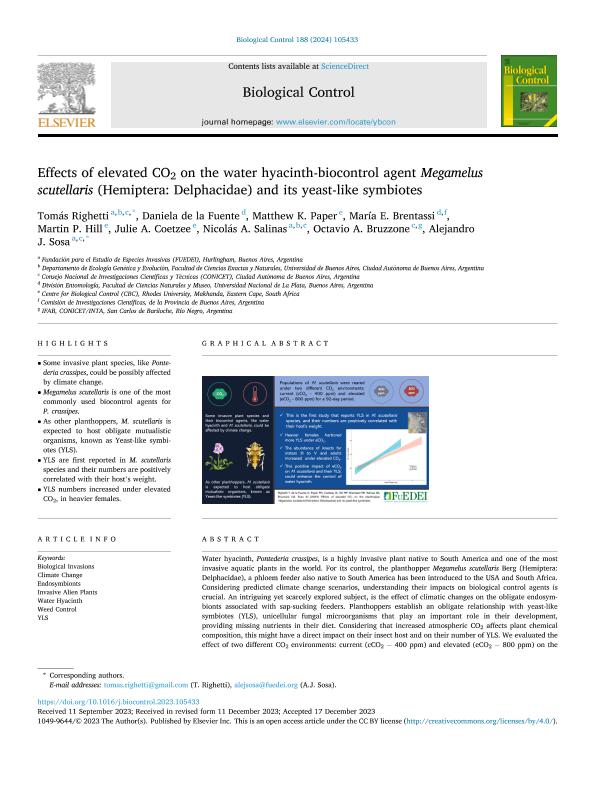Artículo
Effects of elevated CO2 on the water hyacinth-biocontrol agent Megamelus scutellaris (Hemiptera: Delphacidae) and its yeast-like symbiotes
Righetti, Tomás ; de la Fuente, Daniela
; de la Fuente, Daniela ; Paper, Matthew K.; Brentassi, Maria Eugenia
; Paper, Matthew K.; Brentassi, Maria Eugenia ; Hill, Martin P.; Coetzee, Julie A.; Salinas, Nicolás A.; Bruzzone, Octavio Augusto
; Hill, Martin P.; Coetzee, Julie A.; Salinas, Nicolás A.; Bruzzone, Octavio Augusto ; Sosa, Alejandro Joaquín
; Sosa, Alejandro Joaquín
 ; de la Fuente, Daniela
; de la Fuente, Daniela ; Paper, Matthew K.; Brentassi, Maria Eugenia
; Paper, Matthew K.; Brentassi, Maria Eugenia ; Hill, Martin P.; Coetzee, Julie A.; Salinas, Nicolás A.; Bruzzone, Octavio Augusto
; Hill, Martin P.; Coetzee, Julie A.; Salinas, Nicolás A.; Bruzzone, Octavio Augusto ; Sosa, Alejandro Joaquín
; Sosa, Alejandro Joaquín
Fecha de publicación:
01/2024
Editorial:
Academic Press Inc Elsevier Science
Revista:
Biological Control
ISSN:
1049-9644
Idioma:
Inglés
Tipo de recurso:
Artículo publicado
Clasificación temática:
Resumen
Water hyacinth, Pontederia crassipes, is a highly invasive plant native to South America and one of the most invasive aquatic plants in the world. For its control, the planthopper Megamelus scutellaris Berg (Hemiptera: Delphacidae), a phloem feeder also native to South America has been introduced to the USA and South Africa. Considering predicted climate change scenarios, understanding their impacts on biological control agents is crucial. An intriguing yet scarcely explored subject, is the effect of climatic changes on the obligate endosymbionts associated with sap-sucking feeders. Planthoppers establish an obligate relationship with yeast-like symbiotes (YLS), unicellular fungal microorganisms that play an important role in their development, providing missing nutrients in their diet. Considering that increased atmospheric CO2 affects plant chemical composition, this might have a direct impact on their insect host and on their number of YLS. We evaluated the effect of two different CO2 environments: current (cCO2 − 400 ppm) and elevated (eCO2 − 800 ppm) on the abundance of YLS (number of YLS cells/insect) of M. scutellaris, as well as the, age structure, sex, and weight of insects. Heavier females harbored more YLS under eCO2 which underscores the importance of the interaction of CO2 levels and insects’ weight in shaping the abundance of YLS. Additionally, there was a significant increase in the total abundance of insects for instars III to V and adults under eCO2 conditions. However, male number significantly exceeded that of females under both CO2 conditions. Our results suggest a potential positive impact of eCO2 on M. scutellaris populations, which could, in turn, enhance the control of P. crassipes.
Archivos asociados
Licencia
Identificadores
Colecciones
Articulos (IFAB)
Articulos de INSTITUTO DE INVESTIGACIONES FORESTALES Y AGROPECUARIAS BARILOCHE
Articulos de INSTITUTO DE INVESTIGACIONES FORESTALES Y AGROPECUARIAS BARILOCHE
Articulos(SEDE CENTRAL)
Articulos de SEDE CENTRAL
Articulos de SEDE CENTRAL
Citación
Righetti, Tomás; de la Fuente, Daniela; Paper, Matthew K.; Brentassi, Maria Eugenia; Hill, Martin P.; et al.; Effects of elevated CO2 on the water hyacinth-biocontrol agent Megamelus scutellaris (Hemiptera: Delphacidae) and its yeast-like symbiotes; Academic Press Inc Elsevier Science; Biological Control; 188; 105433; 1-2024; 1-8
Compartir
Altmétricas



